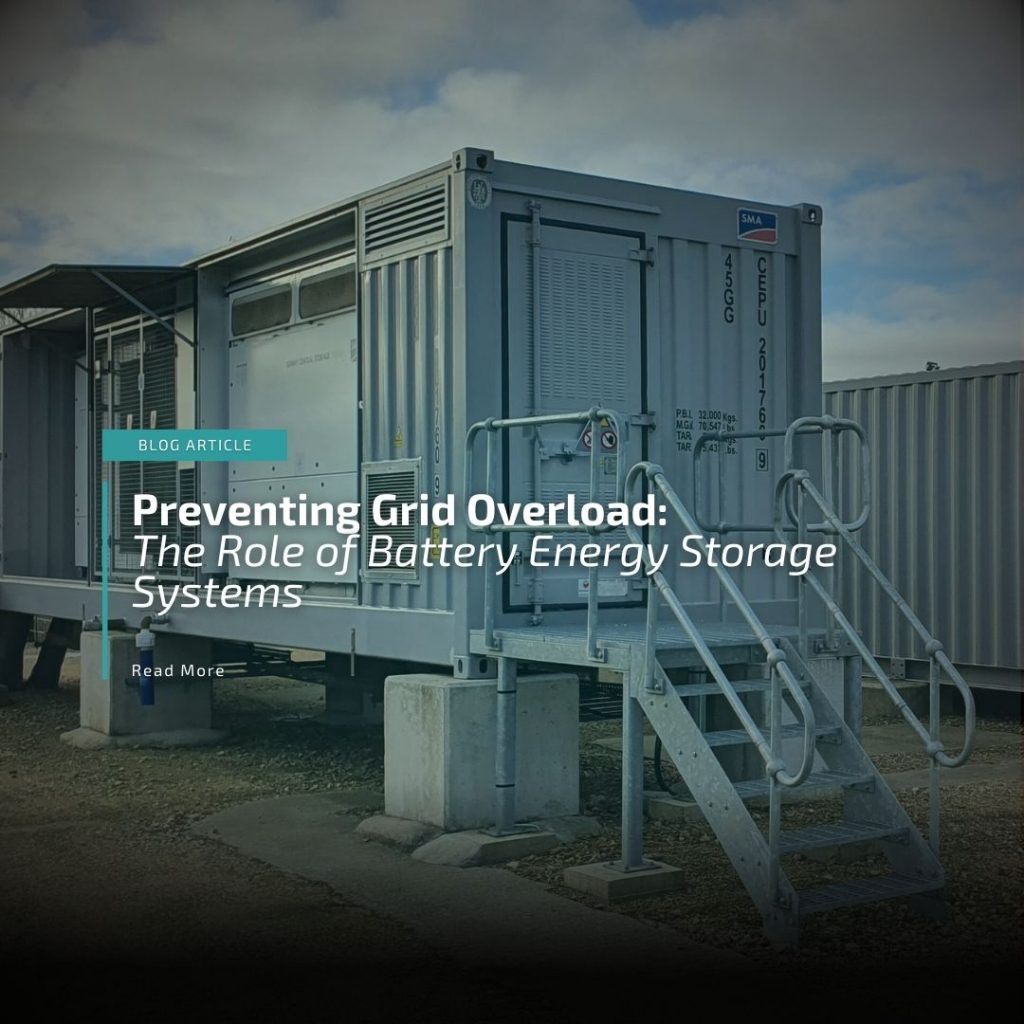As the UK rapidly adopts clean energy to reach ambitious decarbonisation targets, managing grid stability emerges as a significant roadblock. Variable generation from renewable sources such as wind and solar introduces volatility to power supply. Meanwhile, the electrification of transport and heating drastically increases the electricity demand, which can lead to the risk of power outages and drops in voltage. Furthermore, these issues could create widespread chaos and destabilise the power grid.

Innovative solutions are required to prevent grid overload and guarantee a consistent energy supply for consumers. Power System Studies can help to ensure the grid is robust and dependable. These studies also make a case for cutting-edge solutions, such as Battery Energy System Storage (BESS).
In this article, we’ll explore the advantages of battery energy storage systems and how they can help to regulate power supply and prevent grid overload.
Understanding Battery Energy Storage Systems
Strategically engineered BESS is the missing link between intermittent renewable energy supply and real-time electricity demand. Via coordinated charging cycles, these large-scale battery systems absorb surplus solar and wind energy, ensuring no clean power goes to waste. Machine learning optimises the release of stored energy during evening peaks, mitigating the risk of blackouts, even with millions of EVs plugging in. Battery energy storage system prevents overload and stabilises the grid in the following ways:
Reducing Overload Through Peak Shaving
Demand charges are the fees that utility companies charge based on the highest level of electricity usage during specific periods, typically the peak demand periods. These fees are a concern for businesses as they can be costly. An effective way of managing demand charges is through peak shaving.
Peak shaving is a proactive approach that looks to smooth and lower peak loads, thereby reducing or eliminating the short-term demand spikes responsible for high demand charges. Traditionally, peak shaving has been approached in many ways, including:
- Manual intervention: This involves manual oversight, whereby operators monitor energy usage patterns and manually adjust equipment and processes to lessen the impact of spikes during periods of high demand.
- Diesel or gas turbine generators: This is an alternative means of energy during peak demand to reduce demand charges and reliance on the grid.
- Standalone solar PV systems: PV systems offer a renewable alternative to other conventional peak shaving methods and reduce grid dependency.
Maintaining Grid Stability Through Reactive Power Support
Increasing the amount of solar and wind power can cause more volatility in voltages. Since fluctuations can disrupt sensitive digital equipment and cause brownouts, maintaining grid voltage within precise limits is essential.
In addition to peak shaving, battery storage systems deliver vital grid reliability support through a reactive power supply. Grid-connected BESS can respond within milliseconds via power inverters, which dynamically absorb and inject reactive power on distribution features. By smoothing localised voltage sags and swells as they occur, BESS can prevent harmless fluctuations from cascading into unplanned outages.
Energy Equity With BESS: Empowering At-Risk Communities
BESS stands out as a transformative solution in the pursuit of energy accessibility. They are especially beneficial for communities such as remote rural towns, areas that are prone to extreme weather conditions, and urban areas with ageing infrastructure. There are several ways solar battery storage can help these communities, for instance:
- Resilient Microgrids: Due to vulnerabilities in electrical infrastructure, certain areas in the UK are more susceptible than others to power outages. This poses significant threats, especially during emergencies. BESS contributes to establishing resilient microgrids that guarantee energy equity and security by ensuring a continuous and reliable power supply.
- Optimised Solar Self-Consumption: By storing surplus energy generated from periods of high sunlight, BESS ensures a stable power supply to at-risk communities, especially in the face of unpredictable UK weather. Also, this reduces the reliance on external power sources, leading to increased savings.
- Backup Power for critical infrastructure: Stored energy from battery energy storage serves as a lifeline during outages, boosting safety and well-being by powering essential services such as emergency services, water facilities, and data centres.
Conclusion
Battery energy storage systems are driving positive changes in the UK and will help to realise net-zero targets. Large-scale battery systems also empower energy equity and accessibility.
Adopting strategies like peak shaving and reactive power support enables companies to manage demand charges effectively and maintain a more resilient and cost-effective energy infrastructure.
Find out more
To find out more about how we can connect your large-scale battery storage systems to the grid, please get in touch with Engineering Power Solutions on 01642 987240 or email at enquiries@engineeringpowersolutions.co.uk










